Thomas E. Ricks's Blog, page 71
December 17, 2013
And you thought I was kidding the other day about Google becoming the nation's largest defense contractor?

The other day I mentioned the thought that Google one day might be the nation's largest
defense contractor.
Well, that may happen sooner than I thought. Google
just bought a military robotics company. I could see them
easily getting into the UCAV [that is, "unmanned combat aerial vehicle"]
business. Can you imagine a competition for that contract between Northrup
Grumman and Google?
In the unmanned acronym
department, I think we eventually will move to a distinction between autonomous
drones and controlled ones -- UADs vs UCDs? At some point, a thinking UAD will
consciously make a decision to sacrifice itself for the greater good.
Jim Gourley's Military Culture column: Who knew? The Pentagon is TM and ©
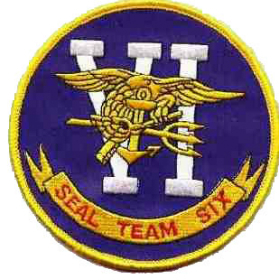
By Jim Gourley
Best Defense military culture columnist
Christmas is almost upon us, which means military
brats, Twitter junkies, and Google Earth nuts around the world will gather
online for NORAD's yearly tracking of Saint Nick as he delivers presents across
the globe. How the tradition began is a heart-touching
story that demonstrates the holiday spirit. The tradition now enters its 58th
year, and despite some PR snags you can keep faith that the Air Force will ensure
it's an authentic experience.
Because they've trademarked it.
The Air Force took the legal step to secure rights
to "NORAD Tracks Santa" just last year. As Air Force staff explained to
the Denver Post, it was more to
protect the endeavor from predatory marketers than to actually turn a profit
(total sales of officially-licensed "I tracked Santa" shirts only
totaled around $200). However, it was a highly visible step in what's become an
aggressive Defense Department-wide initiative to craft the military's good name
into a lucrative brand.
The program began in 2007 when the Defense
Department issued a directive calling for the component services to establish a
branding and trademark licensing office, which would answer to the DOD level
through a separate office working for the undersecretary of defense for public
affairs. Holding to its tradition of being first in the fight, the Marines were
the most aggressive in the early going. In 2009, they began contacting
large-scale print-on-demand t-shirt suppliers Zazzle and CafePress. It
immediately shut down several small online retailers of military-themed hats
and shirts. It even came up with rules applying to USMC-themed stuff sold on Etsy.
The other services quickly caught up. Between 2007
and 2011, sales of officially-licensed U.S. Army merchandise increased from $5
million to $50 million, more than $1 million of which went to the Army in the form of royalties. The
services are fairly uniform in how they treat different manufacturers. So long
as items are handmade and sold face-to-face, they don't intend to charge people
on the grounds that they're probably engaging in healthy patriotism, which they
ostensibly recognize as holding intangible value. But for enterprises taking in
more than $250,000 annually from goods bearing the military stamp of approval,
the services are happy to take up to an 8 percent cut of the profits. The
margins are hardly chasing anyone away. As Catherine Traywick wrote on Foreign Policy recently, clothier Authentic
Apparel Group has gone in big with the Army to create its first officially
licensed fashion line. They even have a bona fide G.I. Joe modeling it. Paying The Rock to wear it and the Army to bless it must come with a
price tag fitting a defense procurement contract. A pair of "Delta
Pants" will cost you 80 bucks. The "Ultimate Bomber Jacket" runs
just over $146 (down from $195!). It provokes one to wonder if the Air Force
would sue the Army over infringement, however, since they do have all the
airplanes.
Maybe they're betting on the drone pilot seat
cushion. Or, more likely, Big Blue has its hands full dealing with its more
than 200 official licensees. It's more than enough for the Marines. The website
for their branding and licensing office specifically tells interested parties
that they have maxed out the number of license holders for shirts, hats, and
mugs. As laid out in the original 2007 directive, all income derived from
licenses in excess of the various offices' operating expenses is channeled to
morale, welfare, and recreation budgets. However, those operating expenses have
ballooned with the increased interest in marketing. To help protect its brand,
the Air Force has contracted a company to make holographic hang tags
identifying officially licensed products. The Army partnered with global brand
management company Beanstalk Group from the very beginning,
helping them to launch more than 50 different product categories, from cologne
to camping equipment, into 80,000 stores across the country.
Whatever the margins are, the sheer volume of the
military merchandising complex makes it an extraordinarily lucrative -- and
reliable -- market. With the military in possession of the most exotic gadgets
and firmly holding the notoriety of America's most trusted institution, it seems unlikely
that its consumer allure will fade in the near future. MWR coffers have a
trustworthy inflow and the military message continues to propagate. It doesn't
always go in expected directions, though. There have been a couple of
noteworthy awkward copyright issues in the last couple of years. Video game
maker NovaLogic sued rival ActiVision over the use of the name "Delta
Force" in one of its Call of Duty
games. The Army didn't touch that one, and eventually the judge dismissed the case. Navy officials were similarly
relieved when public outcry dissuaded Disney from trying to copyright "SEAL Team 6" just days after the death of Osama Bin Laden. There would have been no
way to object to the action, as you can't copyright what you don't acknowledge.
This leads to the final concern, and possible murky
situations on the horizon. Loosely speaking, trademark law requires logos and
marks to be used at least every five years for the trademark to remain in
effect. That leaves a substantial number of "retro" designs ripe for
the picking. And of course there's always room for creative interpretation. The guys at Ranger Up seem to have a good formula, and the outcome of Dan McCall v. Keith Alexander, debating whether a
private citizen can use a governmental agency's logo in the context of
political speech, ought to be as provoking as it is entertaining. Whatever the
decision, if history is any indicator, the military will have a bottomless can
of worms to accompany its golden goose.
Jim Gourley is an
author
, journalist, and former
military intelligence officer.
Quote of the day: Goering's 'word of honor' to the Czech foreign minister
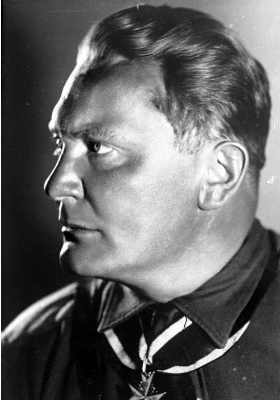
I've
been reading a lot lately about the late 1930s, as part of my research for my
next book. There are many head-slappers, but this quote jumped out at me, from
a statement Herman Goering made to the Czech foreign minister early in 1938: "I give you my word of
honor that Czechoslovakia has nothing to fear from the Reich." A year later, of
course, the Nazis "smashed" Czechoslovakia, to use Hitler's word.
December 16, 2013
Bonenberger's 'Afghan Post': An unusual and interesting memoir of the Afghan war
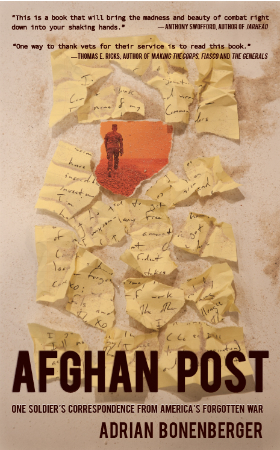
I recently read an advance copy of Adrian Bonenberger's Afghan Post, which is scheduled to be published in January. It is worth reading. He takes
about 50 pages to get up a head of steam, but he is a skilled writer, with an
interesting story to tell as he goes from being a weenie English major at Yale
(yeah, I was too, but I didn't sit in the Elizabethan Club browsing old issues
of Punch, and I never affected the
British phraseology that pimples the younger Bonenberger's prose in the first
part of this book).
The real theme of the book, I think, is that Bonenberger was more
comfortable, more real, in the Army, even in Ranger school, than he was at
Yale. Being an Airborne Ranger meant a lot to him. ("Feels like New Haven -- or,
the way New Haven should've been -- with something more substantial beneath it
all.")
Yet ultimately he decided to leave the Army. He's not a "good soldier," in the
occasionally pejorative sense of that word. He is thoughtful, observant,
skeptical: "No matter how much the Generals, Colonels and Lieutenant-Colonels
would like the soldiers to believe it's the civilians' or politicians' fault
for not supporting the military better, if the buck stops somewhere it should
stop with them."
He's also bothered by how much black Special Operations, he calls "a
professional cadre of assassins," have become the cultural heart of the U.S.
military. He worries, as Andrew Bacevich
does, that we have set up a perpetual machine in the belief that "without these
assassins, we wouldn't be safe, that the only way to deal with the bad terrorist
men was to keep murdering them. Not until they go away, because they'll never 'go away.'"
The scariest line in the book comes near the end: "That was my job, after
all, to believe in the mission, to keep it going even when common sense and
experience was giving me other information." I am not sure I agree with that
job definition. What can a captain do? He can tell the truth to his chain of
command.
His political conclusion, written in 2008 in Afghanistan: "What our
Republic needs is less empire, and more responsible citizenry." Hard to argue
with that.
Is this sentence from Orwell’s '1984'?

"Every sentence of the
decision served as sledge-hammer blow brought down by our angry service
personnel and people on the head of Jang, an anti-party, counter-revolutionary
factional element and despicable political careerist and trickster."
No,
amazingly, it is not from Orwell's dystopian novel, but rather from a statement issued just last Friday by
the North Korean government about L'il Kim having his uncle killed. Of course,
the uncle confessed to everything.
The Defense News top 100?

These kind of games of ranking
influence are fun, and perhaps useful in
that they make one consider how things work. Also, if someone is ranked much
higher than you expect, it makes you consider for a moment whether you fully
understand them.
That said, I find this
list of the 100 most influential people in defense pretty
flawed, and perhaps a bit naïve. I would have included at least one or two congressional staffers,
and a couple of people from the staff of the National Security Council. And in
an administration whose foreign policy is as politicized as Obama's is, I would
expect to see a couple of White House political advisors. Also, I don't think I
saw OMB on that list -- OMB looms very large for defense secretaries.
At
the Pentagon, I suspect the list overestimates Andy Marshall's current
influence, and I say that as the writer who wrote the first profile of him,
about 17 years ago.
Also,
journalists tend to be reluctant to credit the influence of other journalists,
but I think David Ignatius should be on the list. Finally, where is Digital
Washington -- Google, Palantir, and so on? Finally, I think that using little
groups to get in more names is kind of a copout, if the process is indeed intended
to select the top 100.
So,
I would give it a C-.
December 13, 2013
What to do this weekend? Well, here is the grandmother of all military reading lists

Here is a summary by
a couple of New Zealand academics of the books most commonly listed in military
reading lists.
Anyone who has read all of them
deserves some kind of prize.
Top 60 Recommended
Leadership Texts - Global Reading Lists
f
Code
The Art of War - Sun Tzu
23
ML
The Face of Battle - John Keegan
22
ML
Defeat into Victory - William Slim
15
ML-Biog
The Challenge of Command: Reading for Military
Excellence - Roger Nye
13
ML
We Were Soldiers Once and Young - Harold Moore &
James Galloway
13
ML-Biog
The Mask of Command - John Keegan
13
ML
Masters of War - Michael Handel
12
ML
Supreme Command - Eliot Cohen
11
ML
Command in War - Martin Van Creveld
10
ML
The Killer Angels - Michael Shaara
9
Fiction
Company Commander - Charles McDonald
9
ML
Dereliction of Duty - H.R. McMaster
9
ML
Battle Studies - Ardant Du Picq
9
ML
This Kind of War: A Study in Unpreparedness - T.R.
Fehrenbach
9
ML
Band of Brothers - Steven Ambrose
8
History
Acts of War - Richard Holmes
8
ML
Thinking in Time: Uses of History for Decision
Makers - R. Neustadt & E. May
8
Leadership
In Defence of Duffer's Drift - Ernest Dunlop Swinton
8
ML
Leadership: The Warrior's Art - Christopher Kolenda
7
ML
Panzer Leader - Hans Guderian
7
ML-Biog
Diplomacy - Henry Kissinger
7
History
The Prince - Niccolo Machiavelli
7
Lead
Small Unit Leadership: A Common-sense Approach -
Dandridge Malone
7
ML
Once an Eagle - Anton Myrer
7
Fiction
The Forgotten Soldier - Guy Sajer
7
ML-Biog
History of the Peloponnesian War - Thucydides
7
History
Red Badge of Courage - Stephen Crane
6
Fiction
On The Psychology of Military Incompetence - Norman Dixon
6
ML
Leadership Without Easy Answers - Ronald Heifetz
6
Leadership
Follow Me: The Human Element in Leadership - Aubrey
Newman
6
Leadership
One Hundred Days: Memoir of the Falklands Battle
Group Commander - Sandy Woodward
6
ML-Biog
Caesar's War Commentaries - Julius Caesar
6
ML
Into the Storm: A Study in Command - Tom Clancy
& Frederick Franks
5
ML
Knight's Cross: A Life of Field Marshal Erwin Rommel
- David Fraser
5
ML-Biog
The General's War - Michael Gordon & Bernard
Trainor
5
ML
Starship Troopers - Robert Heinlein
5
Fiction
Platoon Leader: A Memoir of Command in Battle -
James McDonough
5
ML-Biog
The Anatomy of Courage - Lord Moran
5
ML
War As I Knew It - George S. Patton
5
ML-Biog
My American Journey - Colin Powell & Joseph
Persico
5
ML-Biog
Infantry Attacks - Erwin Rommel
5
ML-Biog
Hope is Not a Method - Gordon Sullivan & Michael
Harper
5
Lead/ML
It Doesn't Take a Hero - Norman Schwarzkopf &
Peter Petre
5
ML-Biog
George C. Marshall: Soldier-Statesman of the
American Century - Mark Stoler
5
ML-Biog
Good to Great - Jim Collins
5
Leadership
Battle Leadership - Adolf von Schell
5
ML
Eisenhower: Soldier and President - Steven Ambrose
4
ML-Biog
On Becoming a Leader - Warren Bennis
4
Leadership
The Military Maxims of Napoleon - Napoleon Bonaparte
4
ML
The Starfish and the Spider - Ori Brafman & Rod
Beckstrom
4
Leadership
Ender's Game - Orson Scott Card
4
Fiction
Seven Habits of Highly Effective People - Stephen
Covey
4
PD
A Genius for War: A Life of General George S. Patton
- Carlo D'Este
4
ML-Biog
The Instruction of Frederick the Great for His
Generals - Frederick the Great
4
ML
The Generalship of Alexander the Great - J.F.C.
Fuller
4
ML-Biog
Commander in Chief - Eric Larrabee
4
ML
The Soldier's Load and the Mobility of a Nation -
S.L.A. Marshall
4
ML
Men Against Fire: The Problem of Battle Command in
Future War - S.L.A. Marshall
4
ML
Reveries - Maurice, Comte De Saxe
4
ML
Achilles in Vietnam: Combat Trauma and the Undoing
of Character - Jonathon Shay
4
Psychology
2 good reasons to go skiing and eat meat: Hitler the vegetarian also was anti-skiing
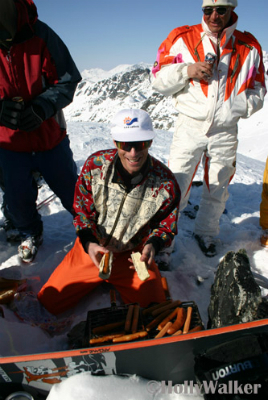
I
knew that Hitler disliked eating meat, but I wasn't aware he also was
anti-skiing. "What pleasure can there be in prolonging the horrible winter
artificially by staying in the mountains?" he once said to Albert Speer. "If I had my way I'd
forbid these sports, with all the accidents people have doing them."
But
if National Geographic is right,
there is indeed a connection: The first people to ski downhill, it avers,
likely were hunters running down deer.
Rebecca's War Dog of the Week: Nominations, please, for War Dog(s) of the Year
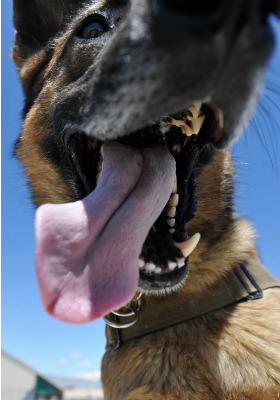
By Rebecca Frankel
Best Defense Chief Canine Correspondent
This was another huge year for the War Dog community -- not
only here in the United States, but worldwide. And for the first time, we at the
Best Defense will be honoring one dog and one person who have made an
exceptional difference in the war-dogs' lives he or she has touched in 2013. And
because this world is so incredibly vast, encompassing many communities within,
these nominations need not be limited to enlisted servicemen and women and dogs.
It certainly could be a deployed service dog (like
Ruth, pictured here), but it could also be a therapy dog (combat or otherwise),
or a retired service dog, or even a civilian canine making rounds in a veterans' hospital. As for the two-legged honoree, again, it could be a
deployed handler, but he or she need only be an individual who as impacted the
war-dog community for the better -- a handler, a therapy dog trainer, a
veterinarian or medic, a generous individual whose simply given their time in
support of our deployed MWDs and their handlers. All's to say, the scope here
is very wide.
So, we're asking readers to send in their nominations. You
can make a comment here on this post or send an email to: WarDogoftheWeek@gmail.com by
Tuesday, Dec. 31. Tom has generously offered to present a signed copy of one of
his books as a prize. I'll pitch in the doggles and super-sized doggie bone.
Above, MWD Ruth, with the 455th Expeditionary Security
Forces Group, takes a break from her obstacle course training at Bagram
Airfield, Afghanistan, on April 28.
December 12, 2013
Why 'Once an Eagle' kind of stinks
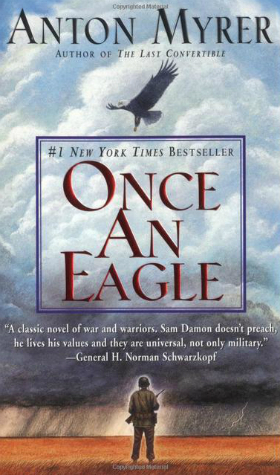
By Col. Robert Killebrew, U.S. Army (Ret.)
Best Defense office of military-literary affairs
I'm probably the
only Army officer I ever knew who wasn't particularly impressed with Once an Eagle,
which I regard as an amusing but not profound military soap opera.
The reason soap operas are popular is because
they are such stereotypes of personalities -- the deceitful husband, the
stalwart wife -- and so is the book. In fact, people, and military careers, are
far more complicated than a soap opera. I have known officers who were
outwardly Courtney Massengales who evolved into terrific commanders, and Sam
Damons who were deliberately lousy staff officers -- where most of us spent the
majority of our lives -- because they, well, wanted to be Sam Damon.
C'mon -- where would
you have put George Marshall, who had every outward characteristic of
Massengale? I rather suspect that for his "Sam" model the author had Vinegar
Joe Stilwell in mind. Everybody loves the picture of Stilwell as the
tough-talking, campaign-hat-wearing simple soldier, but how did he really do at
the senior levels?
If
anything, I think the novel has had a negative effect on the Army, perpetuating
among some senior officers that they should be just simple, hardworking country
boys who don't understand all this staff stuff and who therefore overlook it (a
few recent four-stars come to mind). I've nothing against a good read -- and
the book was amusing -- but that it could be seriously discussed as a model for
officership is a stretch.
Thomas E. Ricks's Blog
- Thomas E. Ricks's profile
- 437 followers



